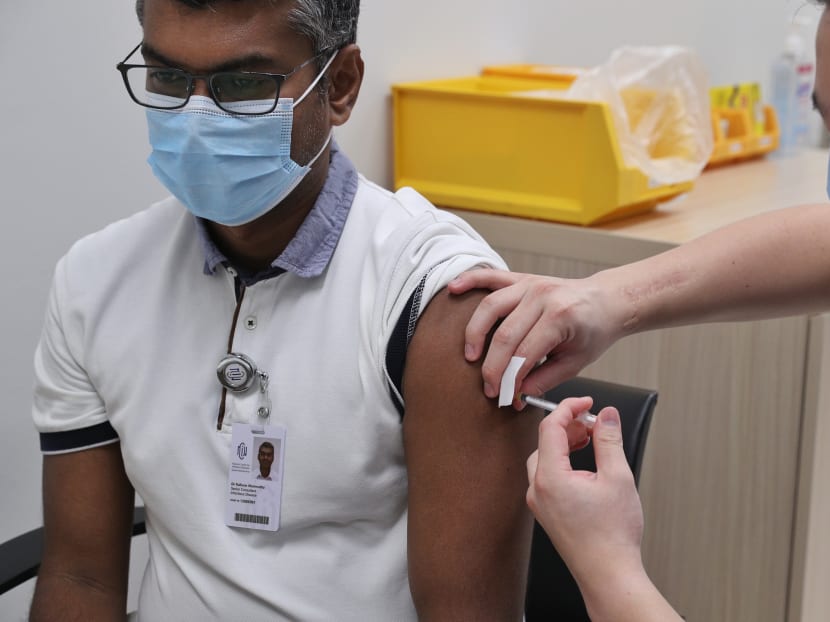First batch of S’pore’s vaccine recipients report no initial side effects: NCID
SINGAPORE — Several hours after getting their first jabs of the Covid-19 vaccine at the National Centre for Infectious Diseases (NCID), none of the first 40 vaccine recipients in Singapore have reported any significant side effects so far, a spokesman from the centre told TODAY at around 6pm.
- First 40 healthcare workers to get the jab have not reported any significant side effects of the vaccine, said the National Centre for Infectious Diseases
- One doctor who was vaccinated said the injection was surprisingly less painful than other vaccinations he has had in the past
- Possible side effects of the Pfizer-BioNTech vaccine include fever and headaches, which are likely to dissipate quickly
- Health Minister Gan Kim Yong, who witnessed the vaccination on Wednesday, said the Government’s priority over the next few months is to ensure the safety and efficacy of Covid-19 vaccines
SINGAPORE — Several hours after getting their first jabs of the Covid-19 vaccine at the National Centre for Infectious Diseases (NCID), none of the first 40 vaccine recipients in Singapore have reported any significant side effects so far, a spokesman from the centre told TODAY at around 6pm.
Dr Kalisvar Marimuthu, 43, an NCID senior consultant who got the jab on Wednesday (Dec 30) morning, said: “With vaccines in general, what usually happens is that you may get some pain in the arm or a bit more than that, like a fever.
“Not everyone will get that. (Pfizer) says around 14 per cent of recipients will experience fever, but I hope I’m not one of the 14 per cent. I feel very fine now, and in fact I’m feeling quite alert.”
The jab itself was “surprisingly less painful” than the influenza vaccine and others he had received in the past, probably because of the relatively lower dosage needed for the vaccine, he added.
NCID senior staff nurse Sarah Lim, who was the first person in Singapore to be inoculated, said she, too, experienced no swelling, no redness of the skin, or any other side effects for now.
Said Ms Lim: “Initially, when the vaccine was injected into my arm, I felt some slight sharp pain, but after the process it was okay… I’m still carrying out my normal duties (as a nurse) and just tell myself to drink a lot of water.”
The duo are among the vanguards to receive the Pfizer-BioNTech vaccine in Singapore at around 9am on Wednesday, all of them healthcare workers from the NCID and on the frontlines against Covid-19.
Typical side effects of Pfizer’s vaccine, which is the only one approved for pandemic use in Singapore currently, include fever, fatigue, headaches and arm soreness — all signs that the vaccine is taking effect.
These side effects usually appear within hours or days of the jab, and are likely to dissipate quickly, experts have said.
A more severe reaction is anaphylaxis, which is incredibly rare, said Dr Kalisvar.
Based on reports, there have only been around 10 reported cases of such reactions out of more than 1.9 million doses of Pfizer-BioNTech and Moderna that have been administered so far.
Health Minister Gan Kim Yong, who witnessed the vaccination, told reporters on the sidelines that the Government’s priority over the next few months is to ensure the safety and efficacy of Covid-19 vaccines, as well as to roll out the vaccination programme to the whole population “smoothly and in an orderly manner”.
“While vaccination will remain voluntary, we do want to strongly encourage Singaporeans to get vaccinated when their turn comes,” he said.
With millions around the world and in Singapore waiting in line to be vaccinated, many are hungry for information about the experience of getting Pfizer’s jab.
Both Ms Lim and Dr Kalisvar had been inundated with questions from curious friends and relatives in the days leading up to Wednesday.
Ms Lim said her mother was worried at first, but it took repeated assurances to put her at ease about the vaccine. Earlier this week, the NCID also held a town hall meeting, helmed by its clinicians, to give staff more details about Covid-19 vaccines.
Ms Lim added that she had no qualms about being among the first groups to be vaccinated: “I want to be a responsible nurse in delivering care to my patients, in protecting myself with the vaccine, (knowing) that I’m also protecting others. As an individual, I want to be a responsible person.”
More healthcare workers will receive their free vaccinations in the coming weeks as the Republic kickstarts its Covid-19 vaccination programme. Next in line are elderly persons above 70, who will get the vaccines from February 2021, followed by other Singaporeans and long-term residents who are medically eligible.
While both Dr Kalisvar and Ms Lim reported no side effects, they will still have to go through a continuous period of monitoring to see if any reactions do arise due to the vaccines.
This includes reporting any symptoms and side effects, including minor pains, to the authorities.
This first batch of vaccinated NCID staff will have to take a second dose on Jan 20, which is 21 days after their first jab.
Dr Kalisvar told TODAY that he feels proud being able to be one of the first to contribute to the monitoring of the new vaccine.
“This is a learning process for everyone after all… What I can say is that there is nothing unusual about the way this vaccine is being prepared or administered at the clinic — it is the same as any other vaccines I have received,” he said.












